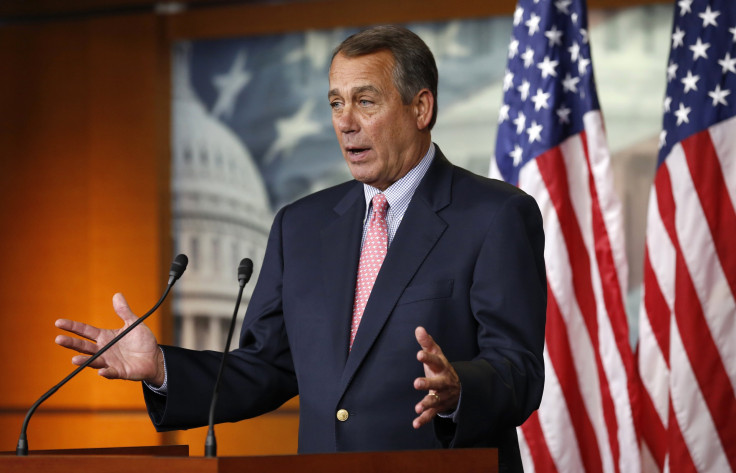On Budget Deal, Boehner Warns Dinners, Phone Calls Not Enough To Sway Republicans

The Senate Budget Committee on Thursday passed its first budget in four years -- along party lines, not surprisingly -- voting 12 to 10 to send the measure to the floor.
When the full Senate considers the bill sometime next week, it will be the first time it deliberates on a budget since 2009.
Committee Chairwoman Patty Murray prepared the fiscal year 2014 budget blueprint, that would turn off the sequester cuts and replace them with a package of spending cuts and tax increases. That bill calls for $975 billion over a decade in spending cuts to reduce the deficit. This includes health care savings she said won’t affect seniors, as well as cuts to defense. Another $975 billion in new revenue is being sought through closing loopholes that benefit wealthy Americans. There is also a $100 billion sum included for spending on jobs and infrastructure.
Murray called the bill a “pro-growth budget plan” she believes is a “balanced and responsible approach” to America’s fiscal challenges.
“This budget reflects the values and priorities of the vast majority of the American public who believe we should put jobs and the economy first, tackle our debt and deficit responsibly, and keep the promises we’ve made to our seniors, veterans and families,” Murray said in a statement.
The Democratic-controlled Senate's panel approved its bill a day after the Republican-controlled House approved its budget resolution -- also along party lines.
The House budget prepared by Budget Committee Chairman Paul Ryan, R-Wis., aims to balance the budget in 10 years and calls for approximately $5 trillion in cuts over that timeframe. True to the Republican position, that budget would not raise taxes and would repeal the Affordable Care Act, often called Obamacare.
“The Democrats who run Washington love to talk about a ‘balanced approach,’” House Speaker John Boehner said earlier this week at a press briefing. “But there’s nothing ‘balanced’ about a budget that never gets to balance. And they have no plan to balance the budget – ever.”
Boehner said a balanced budget means a healthier economy, more jobs and a better outlook for the next generation to have a shot at the American dream. He called on President Barack Obama and Democrats to work with the other side of the aisle.
“We won’t agree on everything, but we should be able to agree on some common goals,” Boehner said. “Number one: how about balancing the nation’s budget? Every family in America has to balance their budget. Washington should too. President Clinton worked with a Republican-led Congress, made balancing the budget a truly bipartisan objective. It’s now part of his legacy. I believe this president should do likewise.”
But Murray begs to differ.
“Their budget doubles down on the policies the American people rejected last election,” Murray said. “It would be devastating for the middle class and the economy, it would dismantle Medicare and the programs families depend on -- and it would do all that while protecting the wealthiest Americans and biggest corporations from paying their fair share. The House Republican plan is anything but balanced, and it’s anything but fair.”
Obama has been making the rounds on Capitol Hill this week in order to get a grand bargain on spending and taxes. He dined with Congressional Republicans, but they are still adamant there will be no new taxes, saying Obama got a tax increase in January, during the fiscal cliff negotiation.
Boehner said he is glad Obama reached out, but that it is going to take more than dinners and phone calls to charm Republicans.
“It’s going to take the president and Senate Democrats rolling up their sleeves and making tough choices about how we solve our nation’s problems,” he said. “No more tax hikes, no more gimmicks, and no more putting off what needs to be done today. And if we work together, we can succeed. We can balance the budget. We can protect the American Dream. And I hope the president and Senate Democrats will join us.”
Murray, too, is hopeful that there could be a bipartisan deal. However, she remains realistic.
“It won’t be easy, but the families we represent are looking to us to move past the gridlock and dysfunction that is hurting our economy and costing jobs,” she said.
© Copyright IBTimes 2024. All rights reserved.






















